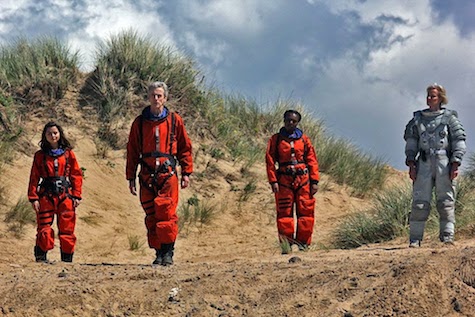Why would we want to kill our moon? Doctor Who was bound to think of a reason at some point, so we’ve arrived. And while the episode delivers some tour de force performances, it’s startlingly difficult to parse out where the center of the episode lies.
Recap
The Doctor has upset Clara’s student Courtney by telling her that she’s not special, and Clara demands that he fix it. He tells Courtney that she can be the first woman on the moon and takes them to 2049, where a shuttle is landing with nuclear explosives. The moon has gained mass, ruining Earth tides and drowning cities. Three astronauts have been sent there, led by Captain Lundvik, to destroy whatever might be the cause.
There were Mexican astronauts who came before them to look for minerals, but Earth lost contact with them. It turns out they were killed, though they don’t know by what. Upon further investigation, they find carnivorous spider-like creatures. One kills Lundvik’s crew, and almost gets Courtney, but she sprays it with cleaner and it dies. This leads them to realize that the creatures are essentially germs. The Doctor goes exploring below the crust of the moon and comes back with the discovery: the moon is not a planet, it’s an egg. There’s an alien life form about to hatch inside it. (How that life form would have suddenly increased in mass by thousands of tons over the course of six months, when it’s been growing for millions of years, is never addressed.) They now have a choice; blow up the alien and kill it so it never hatches, or let it live knowing it might destroy the Earth by accident or design.
Then the Doctor leaves, giving the choice up to Lundvik, Clara, and Courtney. Clara sends a message to Earth and puts it to a vote. The Earth votes to kill the alien. Lundvik is just about to press the button to detonate the bombs, but Clara and Courtney stop her. The Doctor takes them down to the planet to see the birth of the alien, saying that humanity starts going to the stars again because they witness this miraculous event. The alien lays another egg in the moon’s place, so no one is harmed. He leaves Lundvik to continue her astronaut career, and takes Clara and Courtney home.
Once there, Clara has a horrible row with the Doctor, telling him that what he did was no supportive or kind or clever. She doesn’t understand why he left them there to make that decision—one that she feels the need to point out, she almost got wrong. She tells him to leave and not come back. Danny finds her and realizes his fears came true; the Doctor went too far. He tells her that she’s not ready to let go, though, because she’s too angry. He tells her to leave the Doctor when she’s calm.
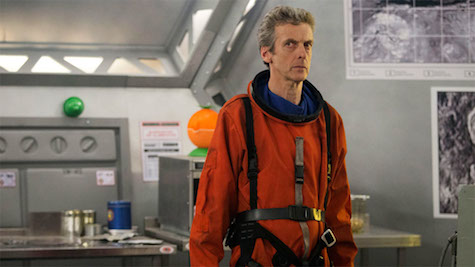
Commentary
Here’s the thing—this episode contains many of the same themes we find in three previous New Who episodes: “The Fires of Pompeii,” “The Waters of Mars,” and “The Best Below.” But it mishmashes them to an extent that it becomes difficult to see what the episode is aiming for as an overall rumination. Is it about renewing a desire for exploration? Friends letting you down? Whether the Doctor lording his expertise over everyone prevents his companions from truly participating in their adventures? About the importance of allowing three women to make a decision on behalf of the whole planet?
There are unfortunately too many questions left unanswered to make this episode the powerhouse it deserves to be. Did the Doctor actually know what was going to happen to the moon? Was he truly trying to help Courtney realize her potential, or was that incidental? While it is refreshing to find some true moral ambiguity on Who, it’s not treated with the distinction it requires. I’m going to try to unpack some of the aspects that stuck out to me, but there’s a lot more going on here.
One of the core themes of the episode is clearly a reaction to the dismantling of NASA’s space program. (Timely, considering that NASA has recently announced its intent to send astronauts to the International Space Station in a few years time.) The suggestion is that space travel has dwindled in the mid-21st century, that humanity has looked to the stars and found only terror. Captain Lundvik says so herself, that she started full of awe and came to realize that our thin shell of atmosphere was all that separated us from oblivion. Her explorative spirit has diminished in face of the unknown. She is jaded and frightened and sees no hope for humanity, though she still intends to protect it.
The decision that Lundvik, Clara, and Courtney are required to make would be more in keeping with this theme had the Doctor deigned to give them even a scrap of information. If he had told them the choice to kill the alien was theirs, while giving his best estimation of what might happen (since he is the resident expert on alien life), then the three women have to decide based on this exact dilemma: the choice between fear or wonder. Hiding away or foraging on. Huddling in the dark or looking to the stars. It would have been a beautiful finale.
But the Doctor doesn’t want to give anything away, so he leaves them without a hypothesis. As a result, the decision hinges on something more primal than that—to kill a new life form before it has begun, or let it live and take a chance that humans will die due to the loss of the moon. Clara wants to be fair, so she puts it to a vote. Turn on your lights to keep the creature alive. Turn them off, and we’ll kill it. (Let’s just ignore the fact that half the planet is asleep while this happens, and also that for the majority of the lights to go out, it’s likely a government shutting off a power grid rather than individuals deciding for themselves.) Humanity elects to kill the creature—yet still, Courtney and Clara say no.
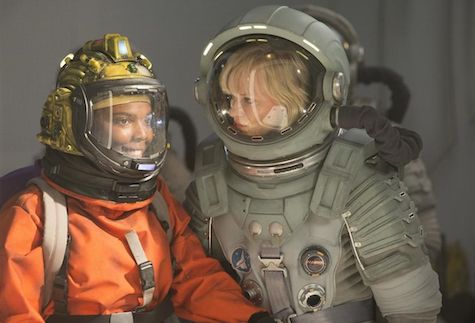
(I have a lot of other thoughts where Courtney is concerned, but that might have to split off into a whole other piece. Her inclusion and treatment said some very specific things about the overall Whovian narrative.)
So here we have another distinct theme that comes up often in Doctor Who—the Doctor is always making decisions for people. He does it because he has the most knowledge in the room, and also just because he wants to most of the time. Because he feels entitled to, just as Danny said in the previous episode. It’s one of the show’s most uncomfortable underpinnings, the fact that the Doctor always appears to be a white man, and spends his days flouncing about making galactic choices without anyone’s say-so but his own. It’s distinctly Imperialistic.
In “The Beast Below,” Amy stopped him from making the wrong choice because she had amassed her own set of facts, and correctly believed that she knew more than the Time Lord did in that moment. She saves the Star Whale. In “The Fire of Pompeii,” Donna takes the ultimate decision away from the Doctor by figuring that she has the benefit of his expertise, but is more qualified (as a card-carrying human) to make the choice on our behalf. In “The Waters of Mars,” the Doctor takes things into his own hands, and is dressed down superbly by Adelaide for having the gaul to put himself above the laws of the universe.
Here, the Doctor is essentially washing his hands of the scenario, trusting his companion to do what he thinks is right in his utter absence. Interestingly, Clara and Courtney both do what the Doctor would have likely done (not in every scenario, but definitely in this one); they go against the wishes of all of humanity to give that creature a chance at life. And it’s an uplifting choice… but it’s also a disturbing one. Because we’re not quite sure if Clara does this because she believes it’s right, or because she knows it’s what the Doctor would want.
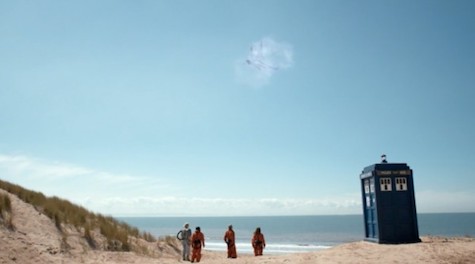
Which then undermines the true point of this escapade; the Doctor is clearly trying to prove Danny Pink wrong. Danny insisted in “The Caretaker” that he’s an aristocrat, that he’s good at getting people to do what he wants by being smart and pompous and “knowing” he’s better. Unlike Rory (who took the Doctor to task for getting people to impress him), Danny puts it in far more hurtful terms—you do this because you’re a commander. And we are your soldiers. The Doctor is obviously trying to prove the opposite in this episode. Here, the choice is yours. I will literally have nothing to do with it! You have the basics, now go nuts!
But it doesn’t really pay off, does it? Especially because we never find out what he knew here. Was time really in flux? Was he counting on Courtney to side with Clara? Did he know that the moon would be back in the form of another egg? (Pretty hard to buy, that one, but something had to prevent the Earth from going wonky.) If we had more of a sense of his knowledge, then the purpose of this test—because it was undoubtedly a test for both him and his companion—would come more clear. It seems as though the Doctor is trying to learn from past mistakes; he doesn’t handle this situation the way he has handled any similar ones previously. But it doesn’t work out in his favor. In fact, it has the exact opposite effect he is intending: he alienates his companion.
It’s the best scene of the episode, one of the best written scenes of the entire season by far, and Jenna Coleman gives her all. We’ve never seen a companion lay into the Doctor this way. He’s been called out and slapped and laughed at before, but no one has ever said in so many words: You abandoned me, you thought it was fun, and you are a terrible friend and a poor teacher. This is the ultimate intersection of the episode. The other aspects, though fascinating, are really just combating for our attention, which is why the whole experience comes off so muddy. We are here to watch this falling out, to watch a companion tell the Doctor that he’s been far beyond careless—he was cruel. And he thought he was doing her a favor.
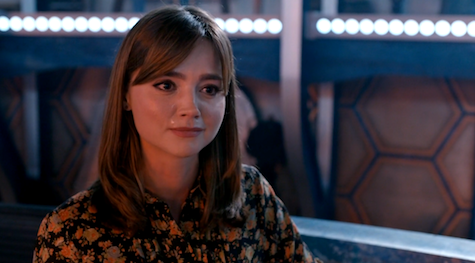
Happily, Danny is there to lend a shoulder and give out hugs, but we still don’t know what this is going to mean for Clara and the Doctor. If this is part of a larger season arc, I’m all for it; it’s a place that Who is usually frightened to go, but the Twelfth Doctor is a prime candidate for this conversation. He’s dear, but he’s also a little mean. He’s caring, but goes callous more readily. This is exactly the sort of Doctor who could stand to learn a lesson about using people—and from a soldier, no less.
Emmet Asher-Perrin is so very impressed with Clara right now. She also thinks the Doctor should rethink that polka dot shirt. You can bug her on Twitter and read more of her work here and elsewhere.










